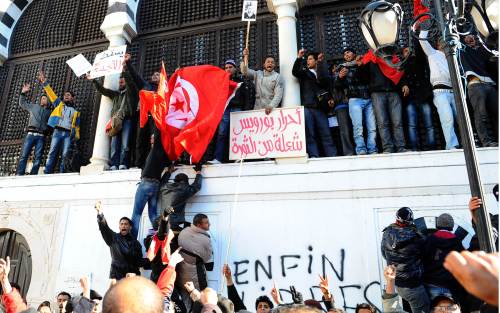CAIRO (AFP) ― The dramatic events that led to the ousting of Tunisia’s president have been echoed across the Arab world, but analysts say it is too early to tell if a “domino effect” could soon topple any leaders in the region.
From the sultanate of Oman to the Kingdom of Jordan, via Sudan and Egypt, the downfall of Tunisian strongman Zine El Abidine Ben Ali has armed opposition groups and unions with fresh arguments and slogans against Arab rulers.
“Tunisia’s popular revolt will have repercussions in the collective memory of people in this region,” Rabab al-Mahdi, a professor of political science at the American University of Cairo, said.
“It will boost their confidence to feel that mobilization can work,” she added.
But Mahdi said she doubted it would “have an impact in the short term, or be directly contagious,” because “the same ingredients do not always have the same results ... and Tunisia was an example of extreme dictatorship.”
 |
Inhabitants of the central Tunisia region of Sidi Bouzid chant slogans during a demonstration in front of the government palace in Tunis on Sunday. (AFP-Yonhap News) |
Indeed, Tunisia’s uprising has led to contrasting reactions in the region.
In Jordan, the Islamist opposition plans an anti-government rally on Friday calling for political and economic reform. Thousands of Jordanians marched across the desert kingdom last weekend protesting unemployment and inflation.
In the face of popular discontent, Jordan announced Thursday a $283 million plan to raise salaries of government staff, as well as the pensions of retired government employees and servicemen.
On Monday, some 200 Omanis rallied against high prices and corruption, a rare phenomenon in the Gulf country that seems to have been touched off by events in Tunisia.
In Sudan, the opposition called for an “end to the totalitarian regime” of President Omar al-Bashir, invoking the Tunisian precedent.
In Algeria, Egypt and Mauritania, several young men have set themselves ablaze, copying the signature protest of a Tunisian graduate whose self-immolation last December triggered the fierce revolt against Ben Ali.
An Algerian opposition party said it would defy a ban and stage a pro-democracy rally on Saturday amid mounting grievances over unemployment and rising costs.
In Yemen, Tunisia’s experience has inspired student rallies and also protests by the Southern Movement, a separatist group calling for an autonomous southern region.
Morocco has not witnessed any protests linked to the Tunisian example. But Rabat did follow the lead of other countries in the region by ordering large quantities of grain to avoid any food shortages fuelling social unrest.
Arab League chief Amr Mussa created a stir Wednesday when he declared Arab citizens are in an “unprecedented state of frustration and anger.”
A 2010 report measuring the progress of the U.N.’s millennium development goals confirmed that social discontent in the region runs deep despite the economic progress of some countries and opulence of the oil-rich Gulf states.
The document, The Third Arab Report on the Millennium Development Goals 2010, estimated an average unemployment rate of 12 percent for the region between 2005-2008, but jobless rates ran as high as 30 percent for youths.
The United Nations reported “grave concerns” in the face of soaring food prices, a rallying point at protests.
Amr al-Chobaki, an analyst with the Al-Ahram Centre for Political and Strategic Studies, says he doubts Egypt will follow in Tunisia’s footsteps because its regime tolerates some protests and media criticism.
“(This) mitigates the risk of a revolution,” he said.
But Antoine Basbous, head of the Paris-based Observatory of the Arab Countries, said Tunisia’s impact on others would largely depend on how events in that country evolve.
“If Tunisia’s transition phase goes well, it will provide an example to follow,” he said.
“But if the country descends into chaos,” he added, “regimes elsewhere in the region will profit to present this experience as a deterrent.”








